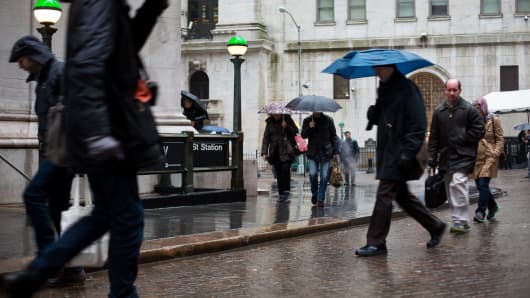 |
| People in front of the New York Stock Exchange Michael Nagle / Bloomberg / Getty Images |
On Wednesday and Thursday, the stock market experienced a significant sell-off, with the Dow Jones Industrial Average, an index that measures the market strength as a whole, dropping over 1,300 points, or 5 percent, and the S&P 500, a similar index, dropping over 150 points, or 5 percent. This marks the largest decrease since earlier this year when the Dow fell over 2,000 points over the course of a week.
As with any significant change in the market, there is no singular cause, but some more specific scenarios reveal part of it. Tech and communications companies took a hit during the week, with AMZN (Amazon) down 8 percent and AAPL (Apple) down 5 percent, indicating that tariffs on Chinese imports imposed by the Trump administration, which stoke fears about increased costs, could be catching up with share prices. In addition, according to CNBC’s Jeff Cox, market experts believe that the Federal Reserve upping interest rates, which make company investment more costly, have also contributed to the recent sell-off, an opinion that is shared by the president, who called the Fed “crazy” when speaking to reporters in Pennsylvania (USA Today).
Generally speaking, the media has a greater impact on public opinion when stories are recent and when the public is not already well informed about the issue. With this story, both of these are true: the market drop occurred over the last couple of days, and the American public is not crazy about the intricacies behind economics. As a result, the immediate press coverage regarding this issue will more or less determine how it is perceived over the next few weeks. However, there is another wrench thrown into the press: the president. By being active and blunt on social media and with reporters, he dictates much of public opinion within his supporters. In this case, by attacking the Federal Reserve, he will probably decrease its favorability with Republicans and open up the approval gap between parties, which was at around 20% in 2014.
Sources:
https://www.cnn.com/2018/10/11/investing/dow-stock-market-today/index.html
https://www.cnbc.com/2018/10/10/why-this-market-selloff-isnt-like-the-correction-earlier-this-year.html
https://www.cnbc.com/2018/10/10/why-this-market-selloff-isnt-like-the-correction-earlier-this-year.html
4 comments:
Being a fairly simple story, unless you try and go into why this happened, which I haven't seen any media do, so I don't see a very large impact of media control on how this story is seen by the public. Also, while this is an interesting counter to the narrative of a "great economy" under president Trump, a two day aberration in the stock market, however large, could likely mean very little.
While I do agree that the complexity of stock market related issues tend to turn away interested citizens, I would argue that the media coverage, as Alex previously posted, would make a large affect on how people perceive this sell out. Specifically, because the media will promote this phenomena using headline that reads something like "Here's why the stock market and what you should do about it"* or "stocks are sliding heres how to protect your portfolio". These headlines base what the people who are unconcerned with complex stocks, but are still attempting to stay current, will see. They will see a stock crash that looks bad/possibly worse than it is and they will see the media blowing it out of proportion even though September and October usually mark the lower points in stock growth annually.* For stories that are large and politically charged, the media really carries no affect over people's gut opinions; however, when the article concerns an issue people are less familiar with, such as stock returns, they are apt, in my opinion, to favor misleading headlines.
* http://time.com/money/5421793/stock-market-crash-dow-investment-advice/
* https://squirrelers.com/2126/
I think it's a great point talking about what the president says. As mentioned in the article, most Americans won't take the time to fully understand why the stock market is acting the way it is and look for a simple explanation. For Trump supporters, there seems to be a fairly easy route of deflection, away from the tariffs and trade wars and to the federal reserve. I think with Black Friday and the holiday season coming up, the stock market's status will be very interesting to observe.
Trump’s tariffs, although good-hearted at the center, ahs not been implemented correctly. He has tried to create jobs for the domestic sector of manufacturing and other businesses, but has also increased costs which has put additional jobs at risk. I believe Trump will have a hard time trying to gain support when he has raised so many costs within the imports to America, especially those that tax on materials that companies need. There are more ways to create jobs, and higher tariffs on goods won’t help in the long run.
Post a Comment